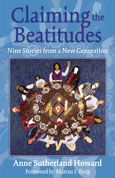As a church leader and writer, I often feel I’m in the midst of converging streams, trying to sort out the flowing torrents. The currents course so quickly that I find it hard to keep up with it all. Technological changes, generational dynamics, environmental instabilities, and philosophical understandings pulsate, making these realities difficult to frame. And yet, in this exciting and hope-filled time, I cannot resist trying to capture the movement.
During the last few decades, we’ve watched the attendance wane in many downtown mainline congregations as demographics shifted. White people moved out to the suburbs, leaving behind many predominately Caucasian congregations that did not know how to reach out to their new neighbors. Evangelical megachurches sprang up on the outskirts of towns, swallowing many of the mainline transplants. With bare exteriors and pleasant interiors reminiscent of shopping malls, these large churches filled with people attracted to charismatic pastors and catchy praise songs. For the last twenty years, eager leaders in mainline denominations have been looking to the robust megachurch movement to teach us how to reach out to our culture in a relevant way.
But that doesn’t seem to be working any longer. As megachurch members age, worship as entertainment seems to be losing its luster. Many evangelical pastors have become exhausted by trying to grow a church on steroids. The children who were raised in megachurches are becoming irritated with the bigger-is-always-better attitude. Frustration with the megachurch model is growing, and attitudes toward evangelicalism in general have hit a new low.
Now, as we reach the time when those of us in Generation X (born in 1961 to 1981) ought to be settling down in our religious habits, we find that many of us have not established any. The sons and daughters of those who abandoned the denominational structures that the mainline church built in the 1950s are now deriding the evangelical churches that grew up in the wake of mainstream Protestant decline.
Not only have religious attitudes changed, but demographics swirl as well. We can no longer trace an orderly pattern of white flight to the suburbs. Now we find rings of suburbs and exurbs, and the cultural makeup of our cities is changing yet again. Younger generations long for the diversity, arts, and earth-friendly transportation of urban centers. Highly skilled and educated men and women of every ethnicity are moving back into the very same urban areas many of their parents fled.
As we catch glimpses of what is swirling, we may wonder where all this is taking us. And we know it is not just generational attitudes and demographics. We realize an important philosophical shift is also taking root, which leads us to ask: How do postmodernism and pragmatism change us and our congregations? How can the church adapt to flourish in this new context? What vital possibilities are arising in this exciting, surging time? How can we reframe our ministries—our faith, our hope, and our love—in the midst of these currents?
I cannot remember a time when the church was the hub of society and life. I was born in the 1970s, part of Generation X. I never lived in a church-centered world. When older members of my congregation tell me about it, I can imagine what it might have been like, just as I can envision a time when people went to church three times a week. But I have never lived in that reality. I’ve always been in a culture where church was a place my friends visited on Christmas Eve—and now even that tradition is beginning to fade. I grew up in the midst of church news filled with clergy affairs, prostitution, and pedophilia. Throughout most of my ministry, I have worked in the shadow of these dark wounds of Christianity, laboring in a world in which the church is renowned for its sex scandals and conservative politics, a world in which people proclaim, “Religion poisons everything.”
This is the culture I know. And this, strangely, is the place I feel most comfortable. It is not that I am happy about our current circumstances but simply that I have not experienced anything else. When I introduce myself as a pastor at parties or neighborhood gatherings, I encounter little awe or respect. Instead, I am met with a ravenous curiosity, as if people did not even realize it was still possible to make that career choice.
Yet, as many mainline churches move farther and farther to the sidelines of our culture, as megachurches lose their entertainment value, and as denominational leaders look to the next generation, there is a great deal of hope waiting to be kindled. I find inspiration in our growing congregation at Western Presbyterian Church in Washington, DC, and in the fact that those who show up to worship here are drawn by a deep sense of community and search for God. I am encouraged by the larger landscape as well. The movement of young adults into urban centers and their ever-increasing reliance on local economies means the model that drove people to the megachurch is breaking down. Urban congregations that did not fare well during the 1970s and 1980s are beginning to see new vitality. The new pictures now coming into focus are shaped by changing demographics, shifting social concerns, and burning spiritual yearnings. As we look toward the future, we can see streams of living water bubbling.
When we consider the progressive political leanings of younger generations, we realize they long for spiritual communities that care deeply about social-justice issues—the same issues that our denominational congregations have been organizing around for hundreds of years. There is a deep spiritual yearning pervasive across generations, yet we know people will no longer settle for one-way preaching and entertaining services. They want meaningful worship, an empowered lay leadership, and a spirituality that leads to action. Again, people are longing for the very things that many denominational churches have been cultivating for decades.
Finally, the coming of age of the Millennial Generation (those born between 1982 and 2001) bodes well for our denominational congregations. Not only is this generation much larger than those that preceded it, Millennials are also much more community focused and institutionally minded than the generations before them. Generational sociologists Neil Howe and William Strauss believe the influence of the rising generation will cause “every arena [to] become more mannerly, structured, and civic minded.” With regard to religion in particular, Howe and Strauss suggest, “Millennials will favor friendly rituals and community building.”
If we begin to reframe the important work of our spiritual communities, taking care to understand the shifts occurring in our culture and to respond to them faithfully, then the years ahead can be extremely fruitful for us. If we realize and welcome the changes that will come, if we can be open to what new adaptations will bring to us, if we can begin to sense the Holy Spirit moving, then we will be able to sense vitality in a new generation.
Reframing Hope named to Top Ten list
Comments welcome on the Alban Roundtable blog
__________________________________________________________
Adapted from Reframing Hope: Vital Ministry in a New Generation by Carol Howard Merritt, copyright © 2010 by the Alban Institute. All rights reserved.
__________________________________________________________
FEATURED RESOURCES
 Reframing Hope: Vital Ministry in a New Generation
Reframing Hope: Vital Ministry in a New Generation
by Carol Howard Merritt
Much has been written about the changing landscape the church finds itself in and even more about the church’s waning influence in our culture. From her vantage point as an under-40 pastor, Carol Howard Merritt, author of Tribal Church, moves away from the handwringing toward a discovery of what ministry in, with, and by a new generation might look like .
 Tribal Church: Ministering to the Missing Generation
Tribal Church: Ministering to the Missing Generation
by Carol Howard Merritt
Carol Howard Merritt suggests a different way for churches to approach young adults on their own terms. Outlining the financial, social, and familial situations that affect many young adults today, she describes how churches can provide a safe, supportive place for young adults to nurture relationships and foster spiritual growth.
 Greenhouses of Hope: Congregations Growing Young Leaders Who Will Change the World
Greenhouses of Hope: Congregations Growing Young Leaders Who Will Change the World
Edited by Dori Grinenko Baker
The authors who collaborated on this book launched a quest for vibrant, life-giving, greening congregations and observed the diverse practices that grow there. They named these churches “Greenhouses of Hope.” A Greenhouse of Hope is a Christian congregation freeing itself to experiment with both newly imagined and time-honored ways of following the path of Jesus. Its members respond to God’s love through practices that genuinely embrace the gifts of youth and young adults. Out of these greenhouses emerge young leaders who want to change the world.
 The Practicing Congregation: Imagining a New Old Church
The Practicing Congregation: Imagining a New Old Church
by Diana Butler Bass
Too many worship services, suggests Graham Standish, are perfunctory, suggesting that most churches don’t think much about how to connect people with God. In God’s Presence makes the case that congregations must restore intentionality and authenticity to worship in a way that will open people to the Holy. Intentionality, he says, reflects a deep understanding of what tradition has attempted to do, what contemporary people are hungry for, what is going on in our culture, and how to connect the three.
 Claiming the Beatitudes: Nine Stories from a New Generation
Claiming the Beatitudes: Nine Stories from a New Generation
by Anne Sutherland Howard
In Claiming the Beatitudes, Anne Sutherland Howard asks the questions, “What would the beatitudes look like today?” and “Is it possible to live a beatitudes life in today’s world?” Through nine remarkable stories of ordinary people, we are introduced to a world where the beatitudes are not an unreachable moral standard, but a simple set of guidelines by which we should live our lives.
__________________________________________________________
REGISTER FOR THESE UPCOMING EVENTS!
Community Ministry: Practical Models, New Resources
May 3, 2011
Palmer Theological Seminary
Wynnewood, PA
Facilitators :

Joy Skjegstad
and
Al Tizon
Do You…
- Need fresh ideas and practical advice on how to move your vision for ministry forward?
- Want to attract new members, keep young adults engaged, and stay relevant in a changing world?
- Wish you knew what is involved in engaging your neighborhood over the long haul?
Then this one-day workshop is for you!
The Business of the Church: Faithful Ministry and Effective Management
May 3- 5, 2011
Lake Junaluska Conference Center
Asheville, NC
Facilitator :
John Wimberly, Jr.
Finances! Facilities! Staff Supervision!
Nobody told me it would be like this!
Are you trying to get a handle on the business of running a congregation? Do you want to learn how to approach management tasks in your congregation in theologically sound and spiritually grounded ways?
Then don’t miss this workshop!
__________________________________________________________
Copyright © 2011, the Alban Institute. All rights reserved. We encourage you to share articles from the Alban Weekly with your congregation. We gladly allow permission to reprint articles from the Alban Weekly for one-time use by congregations and their leaders when the material is offered free of charge. All we ask is that you write to us at alban@div.duke.edu and let us know how the Alban Weekly is making an impact in your congregation. If you would like to use any other Alban material, or if your intended use of the Alban Weekly does not fall within this scope, please complete our reprint permission request form.
Subscribe to the Alban Weekly.
Archive of past issues of the Alban Weekly.
